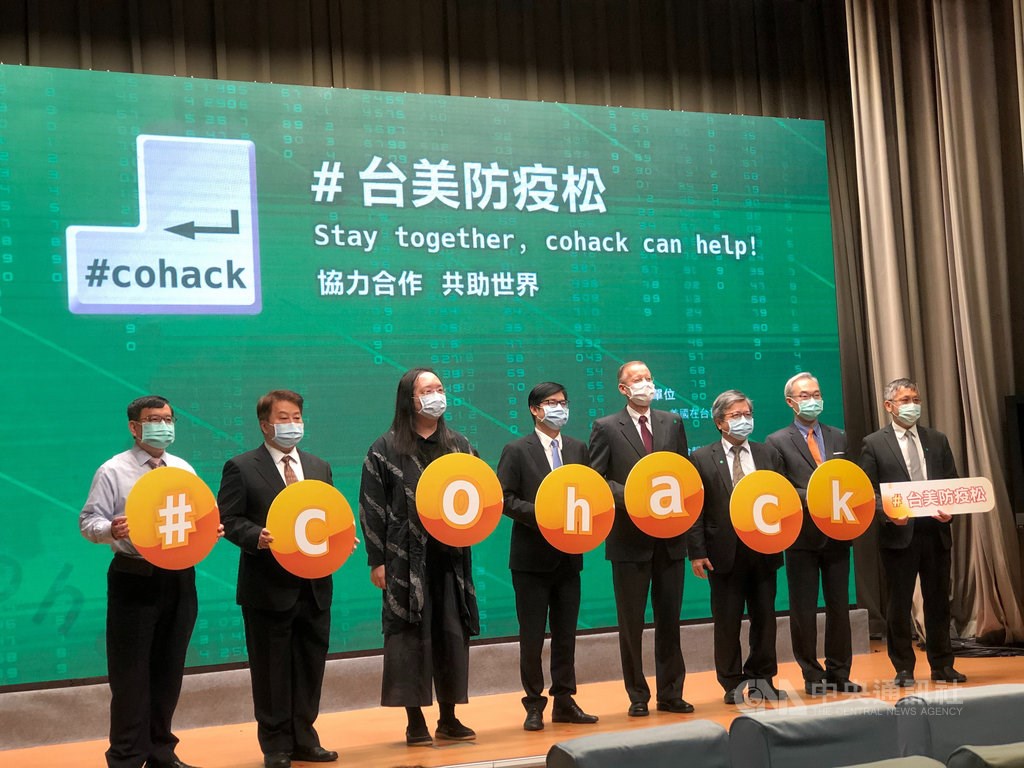Taiwan, U.S. to co-host COVID-19 hackathon
A hackthon competition was announced in Taipei Friday by Taiwan's government and the American Institute in Taiwan (AIT), to boost the development of innovative solutions for controlling and stopping the global coronavirus COVID-19 pandemic.

A hackthon competition was announced in Taipei Friday by Taiwan’s government and the American Institute in Taiwan (AIT), to boost the development of innovative solutions for controlling and stopping the global coronavirus COVID-19 pandemic.
The Coronavirus Hackathon (cohack) contest was jointly introduced by Vice Premier Chen Chi-mai (陳其邁) and AIT Director Brent Christensen to encourage experts in relevant sectors to help create application programs aimed at using data related to epidemic prevention and control in a more efficient and accurate manner.
According to Audrey Tang (唐鳳), Taiwan’s minister without portfolio responsible for digital technology, the cohack will be divided into six categories, including management of epidemic control resources, transition measures ahead of the end of the pandemic, and protection of socially-disadvantaged groups.
The other three categories are the use of predictive tools for policy-making, ways to support frontline personnel in the struggle against COVID-19, and risk communication.
There are no limits to participation, but it is suggested that if taking part in a group, at least one member should have a background in medical care, public health, social work or epidemic prevention and control.
People will be allowed to sign up for the contest and make submissions from May 5-12, with the best five teams to be announced and receive their awards on May 18, Tang said at the cohack press conference.
“It is a token tradition,” said Tang, because the award is simply a rice-cooker-shaped trophy, invitations to be the keynote speaker at workshops and media reports on the work.
The awards are mainly aimed at showing people “the importance of social innovation,” she said.
“The real price is how many lives can be saved, or how the goals of sustainable development are achieved,” the minister said.
Addressing the press conference, Christensen praised Taiwan for its success in controlling the spread of COVID-19 despite its proximity to China and the regular cross-strait flow of travelers and goods.
To date, Taiwan has confirmed just over 400 cases with minimal community spread in a population of 23 million people, he said.
Christensen dubbed such an achievement the “Taiwan Model,” which he said offers five key lessons for the world which can be summarized as the “Five Ts”: Transparency, Transportation Controls, Tracking, Testing, and Technology.
All of Five Ts will be on full display in the hackathon, he said.
“The whole world has much to learn from Taiwan’s example,” he noted. “This hackathon will be yet another example of the fresh thinking one only finds in Taiwan – combining innovative technologies with a commitment to social good.”
AIT represents American interests in Taiwan in the absence of formal ties.
The cohack competition marks another example of Taiwan-U.S. cooperation in efforts to contain the new coronavirus disease outbreak, after the establishment on March 18 of a partnership focused on the research and development of rapid tests, as well as the research and production of vaccines and medicines.
Meanwhile, Taiwan presented its 15 diplomatic allies, as well as the United States and Germany, with a total of 35,000 forehead thermometers and 250 automatic body temperature measurement systems as donations.
At the presentation ceremony held at the Ministry of Foreign Affairs Friday, the AIT director expressed the American people’s gratitude for the generosity of Taiwan.
Calling Taiwan a true friend to the U.S. during the pandemic, Christensen said true friends offer their support during difficult times.
On its Facebook page, AIT posted a message: “Taiwan has not only given the world its effective #TaiwanModel for fighting the spread of COVID-19, it has also displayed generosity to the global community, donating millions of facemasks and other important supplies to countries around the world.”
The post also says that the U.S.-Taiwan friendship is built on shared values, “which include our international values, such as contributing to global problem solving, providing foreign assistance to countries in need, and being a force for good in the world.”
Date: 2020-04-24
Source: Focus Taiwan